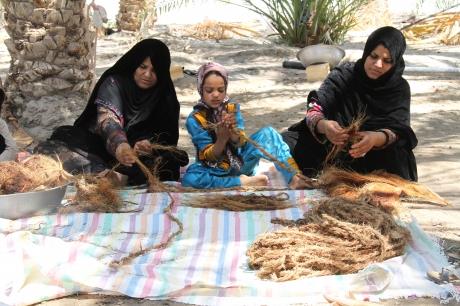In an Iranian oasis, rural women fight to save their village and livelihoods
With the money the women collectively generate, they are helping support their families to meet their basic needs such as food and healthcare.

With the introduction of a Community Fund, the RFLDL helps villagers to start small businesses, such as rope-making for harvesting dates. ©FAO/Amir Khaleghiyan
On the eastern side of Rostam Abad Village, where Kobra Palangi’s family lives, the land is being sieged by advancing sand dunes. “If we do not stop the sand movement, my date palms will be buried under the dunes,” Kobra says worriedly. Rostam Abad Village is one of the many oases scattered in the eastern part of Kerman Province in southeastern Iran.
Over the last couple of years, unprecedented droughts, primarily caused by climate change, have been a severe threat to the village. These droughts, combined with over-grazing, poor land management and inadequate vegetation, mean that this area faces huge risks of soil erosion and sand dune encroachment.
“Last year, our neighbour, an elderly man, was trapped inside his home because dunes were piled behind the door, and we had to rescue him from the back window. If dunes move further toward the village, I will lose my home and garden, and we will be displaced.”
The FAO-implemented Rehabilitation of Forest Landscapes and Degraded Land (RFLDL) project in the area has helped villagers take on this challenge. Funded by the Global Environment Facility and the Government of the Islamic Republic of Iran, the RFLDL project supports community members to form development committees in which to raise and address challenges, such as land degradation. The project has empowered residents to take part in sand fixation and land rehabilitation activities to stop the dunes.
Learn more
